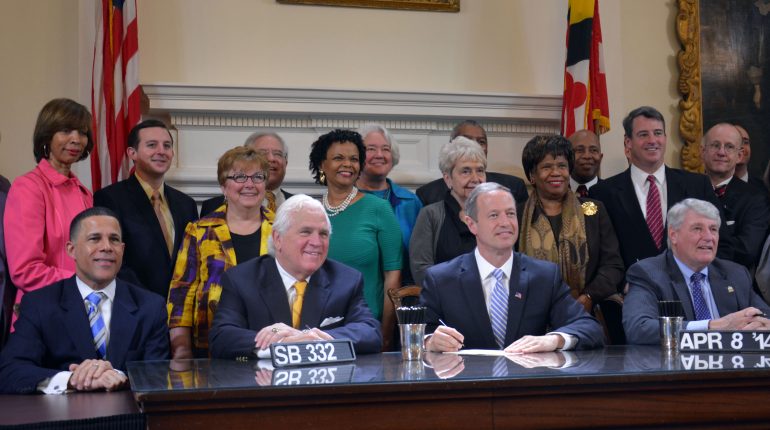ANNAPOLIS – As bill sponsors and other supporters gathered behind Gov. Martin O’Malley for pictures, the governor signed more than 100 bills into law Tuesday, including a prekindergarten expansion and a law ending the practice of holding the owners of pit bulls to a different liability standard than other dog breed owners.
The government will expand pre-K funding by $4.3 million to support an additional 1,600 students. The measure also requires the state budget to provide funding in subsequent years.
The law regarding civil liability for dog owners would end legal measures that singled out pit bulls as being inherently dangerous.

It gives those bitten by any breed of dog the right to sue the owner for damages, but gives the owner the right to defend themselves in court as to whether they knew if their dog was violent. The measure sought to remedy a 2012 court ruling that found pit bulls “inherently dangerous.”
The 2014 General Assembly ended Monday and many of the bills which passed through both legislative chambers are still awaiting the governor’s approval. O’Malley has until May 27 to sign or veto bills.
O’Malley has promised he will sign a bill that would raise the state’s minimum wage from the federally set $7.25 an hour to $10.10, a measure the governor has pushed as his top legislative priority since the start of the 90-day session.
Lawmakers delayed full implementation of the $10.10 wage until July 2018, a year and a half later than O’Malley initially proposed, struck a provision that would have increased pay for tipped workers and added exemptions for seasonal businesses like amusement parks.
Its passage still marks a major legislative victory for O’Malley during his final session as governor.
O’Malley’s legislative victories in prior years include the legalization of same-sex marriage, repealing the death penalty and overhauling the state’s gun control laws following the Sandy Hook Elementary School shooting.
O’Malley has also said he would sign a bill decriminalizing small amounts of marijuana, expressing a change of opinion in a statement released on Monday.
On the first day of the session, O’Malley told the “Annapolis Summit” radio broadcast of the Marc Steiner show that he was “not much in favor” of legalizing or decriminalizing marijuana.
“I’ve seen what drug addiction has done to the people of our state and the people of our city, and I also know that this drug and its use and its abuse can be a gateway to even more harmful behavior,” O’Malley said in January.
But in Monday’s statement, O’Malley said his view has shifted since he was a prosecutor, and he now thinks decriminalization could “lead to a greater focus on far more serious threats to public safety and the lives of our citizens.”
The bill makes possession of less than 10 grams of marijuana punishable on first offense by a $100 fine.

The measure survived a move by the House Judiciary Committee last week to effectively kill it by changing the bill to a task force to study legalization and decriminalization instead.
In the session’s waning days, a group of lawmakers on the House floor successfully stripped the bill of the committee’s change.
While the governor signed a pre-K expansion into law, a package of other education bills passed the General Assembly aimed at supporting Maryland teachers await O’Malley’s approval.
One bill in that package prohibits state-issued student tests from being used for evaluations of teachers and principals until the 2016-2017 school year.
Another would require any waivers that the Maryland State Department of Education intends to send to the federal government to be reviewed by the Legislative Policy Committee.
Additionally, one bill in the package would create a workgroup to make recommendations to better prepare teachers to implement the Common Core State Standards and to determine schools’ financial and technological needs for new student assessments next spring.
Though education was highlighted during O’Malley’s signing ceremony Tuesday, several tax bills passed through the legislature and still need the governor’s signature.
The most highly anticipated of the tax legislation was one that proposes to raise the state’s estate tax exemption level. The bill was sponsored by House Speaker Michael Busch, and passed the House 119-14 in the first week of March, and 36-10 in the Senate not long after.
The estate tax exemption threshold is currently set at only $1 million, but, if the bill is signed into law, the level will gradually rise to match that of the federal government, which currently stands at $5.34 million. The governor is expected to sign the legislation.
The legislature weighed other estate, income and sales tax bills this year that would have offered some tax relief to Maryland residents, but most of them did not make it through the legislature in time for O’Malley to sign.
The governor is also reviewing a bill which passed the General Assembly that would push back a planned wind farm in Somerset County by more than a year. The governor’s press office declined on Tuesday to say whether he would sign or veto the measure.

The bill would delay the Great Bay wind project, which costs $200 million and aims to put at least 25 turbines that are up to 600 feet tall in Somerset County. Project managers said this bill could kill the project during testimony last week.
The bill is supported by U.S. House Minority Whip Steny Hoyer, D-Mitchellville, and would allow for a study that would determine whether it’s possible to mitigate spinning turbines’ potential impact on the radar technology used by a nearby naval base.
Finally, upon passage last month, the governor pledged to sign the “Fairness for All Marylanders Act of 2014,” which would prohibit discrimination against transgender people in public places, housing and employment.
Capital News Service reporters Megan Brockett, Ethan Barton, Tamieka Briscoe and Sarah Tincher contributed to this article.


You must be logged in to post a comment.